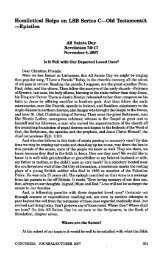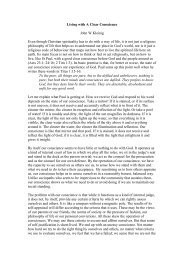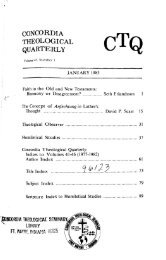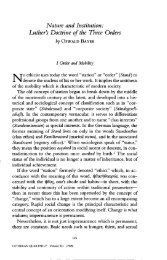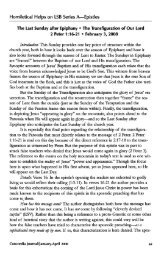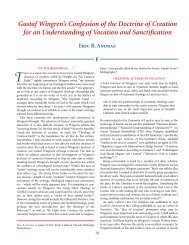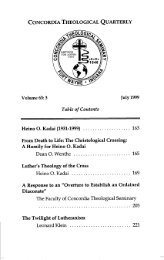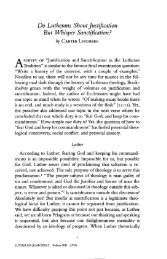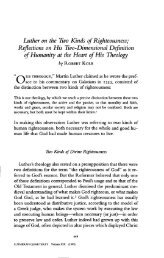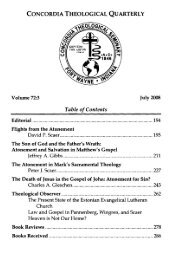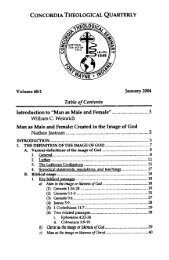Depression and the Soul Pietsch
Depression and the Soul Pietsch
Depression and the Soul Pietsch
Create successful ePaper yourself
Turn your PDF publications into a flip-book with our unique Google optimized e-Paper software.
Suffering from depression is not in itself a sin, nor can it be interpreted as divine punishment for<br />
particular sins, but is a symptom of <strong>the</strong> brokenness of sin in our world. At <strong>the</strong> same time <strong>the</strong> truth is that<br />
depression sufferers are sinners too, with <strong>the</strong>ir own particular temptations <strong>and</strong> weaknesses. 22<br />
Recognising <strong>and</strong> confessing <strong>the</strong>ir sins <strong>and</strong> weakness before God may be a very helpful preparation for<br />
receiving Gods healing forgiveness, grace <strong>and</strong> provision (Lake: 346). There are rites <strong>and</strong> resources for<br />
<strong>the</strong> use of both lay <strong>and</strong> ordained pastoral carers to use for this purpose (Schubert: 27-39).<br />
Private confession <strong>and</strong> absolution is best used within <strong>the</strong> context of pastoral conversation, counselling<br />
<strong>and</strong> prayer. 23 Discerning, clarifying, encouraging <strong>and</strong> listening are needed to introduce <strong>the</strong> rite <strong>and</strong> <strong>the</strong>n<br />
set helpful directions afterwards. Depressed people need above all to have emphasized to <strong>the</strong>m <strong>the</strong><br />
reassurance of <strong>the</strong> Gospel. These performative words of forgiveness are powerful <strong>and</strong> healing. While we<br />
should not expect an instant recovery from <strong>the</strong>m, in <strong>the</strong> over-all journey toward healing <strong>the</strong> soul, <strong>the</strong>y<br />
play a central role in breaking <strong>the</strong> power of <strong>the</strong> vortex.<br />
Worship Participation<br />
Though people with depression are often resistant to God’s Word, <strong>and</strong> may even be angry with God,<br />
going to public worship is very important for <strong>the</strong>m. Church-going is not popularly thought to be a form<br />
of pastoral care, but it is <strong>the</strong> most basic <strong>and</strong> effective form of pastoral care; it’s <strong>the</strong> way for a depressed<br />
person to come into contact with God’s gifts. Despite <strong>the</strong> toxicity of <strong>the</strong> depressive thoughts <strong>and</strong> feelings<br />
<strong>the</strong>y bring with <strong>the</strong>m, <strong>the</strong> synergy between <strong>the</strong> Word <strong>and</strong> <strong>the</strong> ga<strong>the</strong>red community of <strong>the</strong> saints is a<br />
healing environment.<br />
And here is <strong>the</strong> crucial point: <strong>the</strong> power <strong>and</strong> efficacy of <strong>the</strong> healing that God gives to us in worship,<br />
through his Word <strong>and</strong> Sacraments, does not depend on our ability to directly feel it. Lu<strong>the</strong>ran pastor,<br />
Todd Peperkorn, in <strong>the</strong> moving story of his own major depression, says<br />
They [<strong>the</strong> Word <strong>and</strong> Sacraments] will sustain you, whe<strong>the</strong>r you feel like <strong>the</strong>y will or not, whe<strong>the</strong>r you<br />
feel you can pray or not, even if going to church seems empty <strong>and</strong> flat, God will never ab<strong>and</strong>on you<br />
…(71)<br />
Sometimes of course a person is simply not yet able to cope with public worship, <strong>and</strong> we must respect<br />
<strong>and</strong> not to violate <strong>the</strong>m by forcing <strong>the</strong> issue. In this situation wisdom is needed. It is time to keep silent,<br />
to watch <strong>and</strong> pray for when things will change. There is no set pastoral “methodology” here. The carer<br />
must “learn <strong>the</strong> person” as <strong>the</strong>y share <strong>the</strong>ir journey, keeping vigil with <strong>the</strong>m.<br />
Prayer <strong>and</strong> Lament<br />
Many depression sufferers find prayer very hard if not impossible. It feels lifeless <strong>and</strong> artificial. One<br />
such Christian whose story I read, Alex<strong>and</strong>er Davidson, found that <strong>the</strong> more he tried to pray <strong>the</strong> more he<br />
began to be angry <strong>and</strong> even to hate God, <strong>and</strong> wanted to punish him by ignoring him. But strangely, it<br />
was when he began to give voice to this anger at God, that his prayer life was reborn in a strange <strong>and</strong><br />
unexpected form – lament. As his heart began to speak again, his shattered faith began to recover. For<br />
22 Depressed people (men especially it would seem) may resort to pain numbing “self-medication” like alcohol <strong>and</strong> o<strong>the</strong>r<br />
drugs, pornography, gambling, compulsive eating <strong>and</strong> o<strong>the</strong>r things that provide some sense of relief or satisfaction. When<br />
this is happening, it is often matched by remorse, guilt <strong>and</strong> shame (Weiss, Griffin & Mirin: 121- 123).<br />
23 In more casual <strong>and</strong> conversational situations (in <strong>the</strong> consolation <strong>and</strong> conversation of <strong>the</strong> bro<strong>the</strong>rs <strong>and</strong> sisters), when <strong>the</strong>y<br />
have come to trust <strong>the</strong> carer, people may effectively make a confession of <strong>the</strong>ir sins, <strong>and</strong> it is important here to remind <strong>the</strong>m<br />
of God’s forgiveness, <strong>and</strong> let <strong>the</strong>m know that <strong>the</strong>y can rely on it (Schubert 33).<br />
11


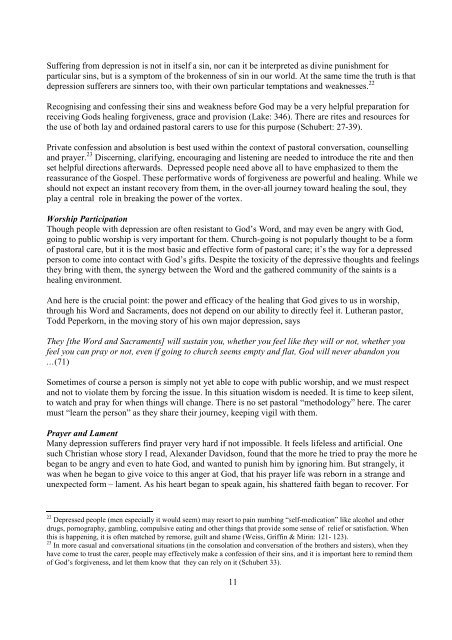
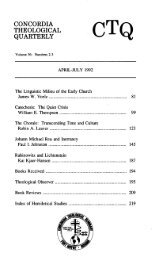
![VI nodaļa: CilvÄks â kas un kÄds viÅÅ¡ ir? [h]](https://img.yumpu.com/48350403/1/190x245/vi-nodaa-1-4-a-cilvaks-a-kas-un-kads-viaa-ir-h.jpg?quality=85)
